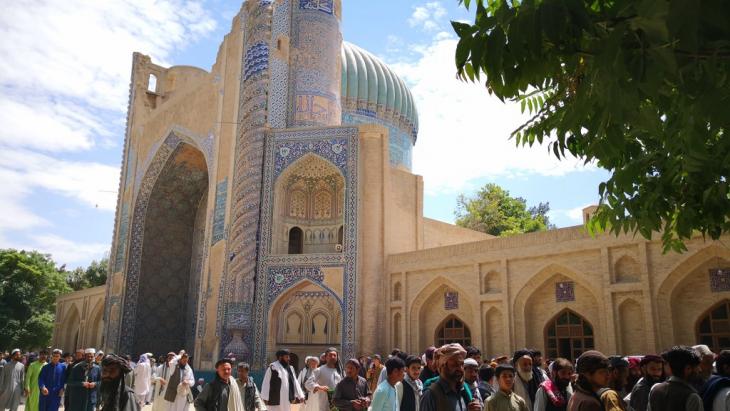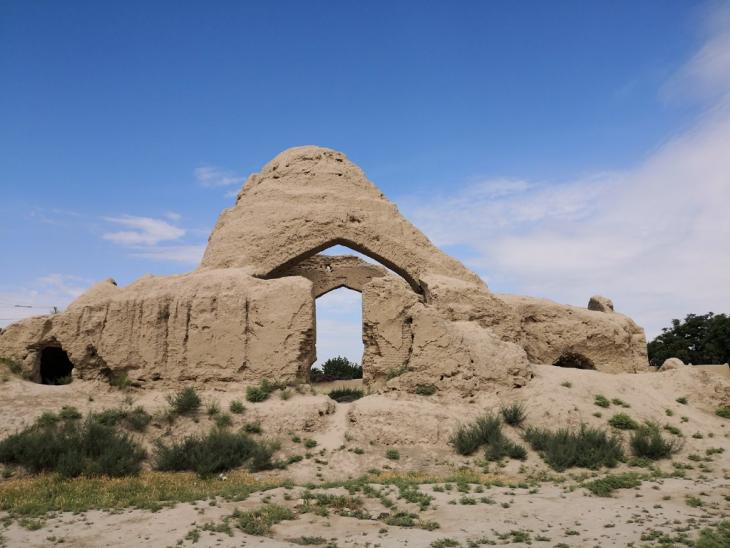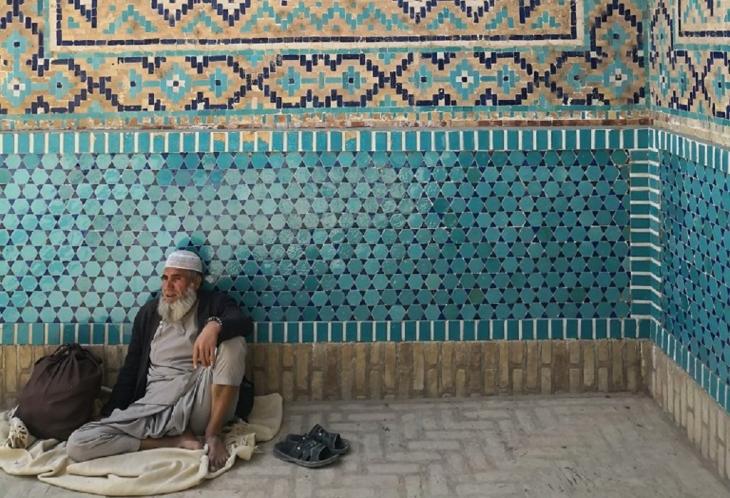On Rumi's trail in Afghanistan

"Welcome to Rumi's city" said a sign on the road into Balkh. It was a Friday morning in Ramadan 2019, and the streets were deserted apart from a few weary shopkeepers just opening up for the day. So this was where the great Mowlānā — Rumi is known to Afghans by his Arabic honorific, "our master" — is said to have been born 816 years ago.
Along the Hindu Kush, Rumi is regarded as Afghanistan's national poet and quite possibly the country's most famous son, though there are recurring quarrels with Iran and Turkey over his legacy. Statues have been erected to him and streets named after him, and although decades of war have taken pretty much everything from the Afghans, nothing can take their pride in Rumi.
Scarcely any access to Rumi's poetry
Today, however, with Afghanistan's high illiteracy rate of around sixty per cent, most Afghans scarcely have any access to Rumi's poetry. The oral traditions of reciting poetry and telling stories have also largely been lost. And so, the reading of the Masnavi, once an important spiritual practice in Afghan Sufi orders, is much less widespread than it is in neighbouring Iran, where works by Rumi fly off the shelves like modern bestsellers.
A few kilometres outside Balkh, which lies half an hour's drive west of Mazar-e Sharif, stands an old mud-walled house where Afghans believe Rumi was born. While historically, this may be rather far-fetched, the crumbling clay dwelling is a sight that Rumi pilgrims still make the journey to see.
"Beside a farming village, a sandy path branches off from the road, leading past a makeshift football pitch where five boys are kicking a ball about. The lads stand motionless as they watch the car I'm sitting in drive past. The youngest chews shyly on the hem of his grubby t-shirt, exposing his belly button.

It doesn't seem like many visitors come to the ruined mud house that stands surrounded by wheat fields, dry shrubs and crooked utility poles. The ruined building, which Afghans say is Rumi's birthplace, looks like an oversized beehive. It has four arched openings at the sides. Beneath the crumbling render, you can still see rows of mud bricks, but the domed roof has almost completely caved in.
I climb inside. The cracked earth floor is overgrown with brambles. Flies buzz around fresh animal dung. My eyes travel upwards. Little sheep-like clouds are scudding across the blue sky. For a moment, I stretch my imagination and try to picture how the young Jalal al-Din Mohammad might have lived here as a little boy.
Jalal al-Din, the "shine of religion", was a thoroughly prophetic name for his parents to have chosen for him, for one day, Rumi would indeed make his religion – Islam – shine in all its beauty."
Once an important cultural city
Alongside Herat, Samarkand and Nishapur, Balkh was once one of the four most important cultural cities in Khorasan, a region that has produced a large number of Islamic researchers and mystics. Khorasan's fame is almost proverbial in Sufism.
The French Buddhist and explorer Alexandra David-Néel also suspected that the legendary Buddhist Kingdom of Jambhala was once to be found in Balkh. What is known for certain is that until the destructive Mongol invasion under Genghis Khan, Balkh was an important centre of Buddhism and Zoroastrianism.
When I visited, Balkh was a dusty collection of flat-roofed houses. The centre featured a roundabout on which the town bazaar was located. This was frequented largely by bearded men in turbans. Even before the Taliban seized power, women seemed to be almost entirely absent from the streets of Balkh.

Afghan friends had warned me that the town was home to a lot of Taliban sympathisers, and that foreigners were not welcome. A good two years later, the town would fall to the Islamists weeks before Kabul and Mazar-e Sharif.
"The square outside Balkh's Green Mosque is empty and lifeless. If the 15th-century building were situated elsewhere, it would attract a lot of tourists. The scars of war are visible everywhere: the upper part of the iwān, the arched entrance to the mosque, has broken off, and only a few characters remain of the blue-tiled Koran verses that once decorated its edges. Only half the minaret is still standing. Like the trunk of a felled tree, it is a reminder of the irreparable damage that Afghan cultural heritage has suffered.
A middle-aged gentleman in a prayer cap sits on a white cotton blanket in the shade of the iwān, his hand on his drawn-up knee. The mosaic script above his head reads, "Al-mulk l'illah", "Sovereignty is Allah's".
Suddenly the resting man rises, folds up his blanket, strides towards me and, without introducing himself, begins talking insistently to me. His regional accent means I can only understand a little of what he says. The Persian I learned six years ago in Tehran has a softer sound than the Afghan Dari, and is peppered with French loan words, even if it is essentially the same language with some small differences in vocabulary.
All the same, I do manage to catch a few sentences of his monologue. 'We are Muslims. But there is no Islam here,' the man rails. 'Just take a look at the park over there, at how the men ogle the girls. But in Ramadan you should fast with your eyes, too! The people here have nothing to eat, either. I tell you, people in the West are more Muslim than we are.'

I smile inwardly to myself, and outwardly make noises of agreement. I'm not sure whether this talkative gentleman has identified me as a westerner or takes me for an Afghan tourist. His words remind me of the lament of the Sufi Abul al-Hasan Fushanji from the 10th century: 'Today, Sufism is a name without a reality, where once it was a reality without a name.'
No sign of spirituality and aestheticism
My impression that there was no longer any sign in Balkh of the aestheticism and free-thinking that characterised Rumi's Islam was confirmed at Friday prayers in the Green Mosque. In his sermon, the imam indulged in a hate-filled tirade in front of those who had come to pray, railing against America and literally screaming at the bored faithful of his congregation. They seemed to be going through the prayers mechanically, and the whole atmosphere in the mosque was devoid of spirituality."
Rumi's poetry repeatedly denounces fundamentalism and sectarianism. He warns against reducing religion to mere form – be that in prayers, fasting or everyday language – and in so doing forgetting its real meaning. In the Masnavi, for instance, he says: Go beyond form, flee from names! / Flee from all titles and names, towards meaning!
"When hundreds of people leave the mosque at once, a human traffic jam builds up around the exit. A handful of women in blue burkas are squatting there on the earth. The first women I have seen in Balkh – though I can't see them properly, of course – stretch their hands out, begging for alms. An old man distributes white bread to the crowd. A horde of children instantly pounce on the man and begin to fight over the loaves. After the strange prayers, this scene only increases the unease in the pit of my stomach.
Feeling churned up inside, I escape into the park beside the mosque. The liveliness of the broad-leaved trees is like a balm against the man-made disharmony. Here I find air to breathe once again; I sit down on the grass and watch what is going on around me.

A young couple rest in the shade. A boy pedals a bike that is much too big for him. Suddenly the back wheel skids out from under him. He falls and for a moment lies buried beneath his heavy bicycle. Without so much as shedding a tear, he pushes it off himself and clutches the leg that hurts. Then he gets back in the saddle and sets off for another lap.
In the middle of the park is a playground consisting of a swing and a climbing frame. Two boys are see-sawing on a rusty iron bar. A group of children have thought up their own game. Three girls dressed in bright colours and a little boy, all of them barefoot, have tied two scarves together in the middle. Each of the children holds tight to one of the four ends. Then they start turning in a circle. The improvised roundabout spins faster and faster until after a few turns, the little boy loses his grip and tumbles backwards into the grass. The girls spin a few more times, but the four-in-hand is out of balance.
Then the whole thing starts from the beginning again, amid squeals of joy and laughter, until someone falls down. The girls' beautiful faces are a picture of animation. They don't lose enthusiasm for the game; they are fully in the here and now, revelling in that innocent exuberance that only children possess.
As if in a trance, I can hardly tear my eyes away from this scene. For a moment I try to picture what kind of a future these children can expect here in Balkh. Perhaps in a few years' time the little boy will take over the patriarchal customs of the people around him. Where will the girls be then? Will they be able to preserve their joy in life once they are young women? And who am I, in any case, to answer these questions?
I bring myself back to the moment and allow my heart to be moved by the children's energy. If Rumi is to be found anywhere in Balkh, then it is here with them."
© Qantrara.de 2023
Translated from the German by Ruth Martin
All quotes taken from Der Schatz unter den Ruinen: Meine Reisen mit Rumi zu den Quellen der Weisheit ("The treasure among the ruins: my travels with Rumi to the springs of wisdom") by Marian Brehmer
Marian Brehmer read Iranian Studies at university and is a freelance author who focuses on Islamic mysticism.
